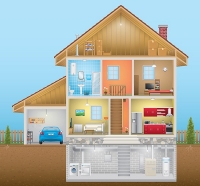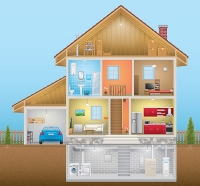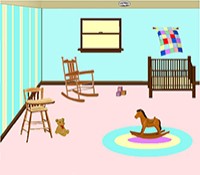Healthy Homes - Nursery
Health and safety tips
- Use electrical outlet covers and safety plugs to prevent objects from being pushed into outlets.
- Always supervise your child while bathing; stay within arm’s reach of the child at all times.
- When using a changing table, keep one hand on your baby at all times. Changing table should be cleaned and sanitized after each use.
- Maintain smoke alarms and carbon monoxide detectors. Change batteries as recommended by manufacturer.
- Avoid products containing the chemical Bisphenol A (BPA).
- Maintain a smoke-free zone around your baby.
- If remodeling the nursery, protect your children from lead-based paint.
- Ensure your baby travels in a proper child safety seat at all times.
- Never leave a child unattended, especially in a car, not even for a short time.
- Use baby gates and door barriers across kitchen and bathroom doors and staircases.
- Store medicines and cleaning products out of reach and in lockable cabinets.
- To prevent choking, choose age-appropriate toys with no small parts that could be a choking hazard.
Green tips
- For cleaning everyday surfaces, mix equal parts water and vinegar in a spray bottle.
- Spray on surface, let sit and wipe off.
- Make a soft scrub for cleaning by mixing baking soda and castle soap.
- Keep the nursery air fresh by opening the windows each day or use a HEPA air purifier.
- Consider flooring that is easy to clean.
- Choose bedding made with natural organic fibers.
- Consider using cloth or compostable disposable diapers.
Help Us Grow (HUG)
The HUG program staff can assist pregnant women, postpartum women for up to two years, and infants and children up to age six in gaining access to medical, social, and educational services. HUG services are available in all 95 Tennessee counties. For more information about the TDH home visiting programs, call (615) 741-0329.
A-B-Cs of Safe Sleep
The lives of some babies are cut tragically short as the result of being put to sleep in an unsafe place or position. Choosing to follow the A-B-Cs of Safe Sleep can protect your baby the one time he or she may be suffocated while sleeping. Visit the Safe Sleep website for recommendations to protect your baby including a Safe Sleep Checklist.
For a safe sleep environment remember to always:
• Follow the ABCs of Safe Sleep: Always place your baby Alone, on their Back, and in a Crib.
• Use a firm mattress with a fitted sheet and avoid soft bedding, pillows, stuffed animals, or bumper pads.
• Ensure the crib meets current safety standards (check for recalls at [CPSC.gov].
• Keep the room at a comfortable temperature (68–72°F) to prevent overheating.
Lead-based paint
Are you remodeling a room in your home to make a nursery? In homes built prior to 1978, there is an increased risk of having lead-based paint. If small children ingest lead-based paint chips or dust during hand-to-mouth behavior, they could be exposed. If you are remodeling an old home, the risk could be even higher. Lead check test kits are readily available from home and hardware stores. For more information about preventing childhood exposure to lead, visit the Tennessee Childhood Lead Poisoning Prevention Program (TCLPPP) webpage or our webpage about lead.
Asthma
It may be difficult to diagnose whether an infant’s breathing problems are a result of simple cold viruses or other problems such as asthma. Your family doctor can help. Keep in mind infants spend a lot of time in their nurseries. For children with difficulty breathing, breathing and sleeping may be more difficult if there are asthma triggers in the home or nursery.
Breathing can be made difficult by the smoke from the burning end of a cigarette, pipe or cigar and the secondhand smoke breathed out by a smoker. Do not smoke in a house where a baby is present.
It is important to wash bed linens on a regular basis. Also, remove dust often with a damp cloth and vacuum carpet and fabric-covered furniture to reduce dust buildup. Nurseries that are kept clean will help to control asthma triggers.
Prevent exposure to pests
• Tennessee’s warm climate can attract pests like mosquitoes, ants, and even bed bugs. Use baby-safe pest control methods:
• Install window screens to keep insects out.
• Avoid using chemical pesticides in the nursery; opt for natural repellents like essential oils (e.g., lavender or eucalyptus) placed safely out of reach.
• Regularly inspect the nursery for signs of pests and address issues promptly.
Temperature and Air Quality
It is important for your baby's health to have good air quality in the nursery.
• Tennessee’s humidity can lead to mold growth. Keep the nursery well-ventilated and use a dehumidifier if necessary.
• Avoid smoking indoors, as secondhand smoke can harm your baby’s respiratory health.
• Use an air purifier with a HEPA filter to reduce allergens like pollen, dust, and pet dander.
Babies easily over-heat. Follow these tips to prevent heat-related illness.
• Tennessee summers can be hot and humid. Keep the nursery cool
• Use blackout curtains to block heat from the sun.
• Dress your baby in lightweight, breathable clothing.
• Never leave your baby in a hot car, even for a few minutes.
Women, Infants and Children
Women, Infants and Children, often called WIC, is the Special Supplemental Nutrition Program. WIC is a federal program that provides supplemental food to low-income pregnant, postpartum and breastfeeding women, infants and children until the age of five. WIC provides a combination of nutrition education, supplemental foods, breastfeeding promotion and support, and referrals for health care. The Department of Health serves about 165,000 eligible participants each month. Participants must be residents of Tennessee, meet the gross income guidelines, and be determined to be at nutritional or medical risk. For more information, contact your local health department or call 1-800-DIAL-WIC (1-800-342-5942).
Practice Healthy Feeding –
• If using formula, ensure it’s prepared with safe, clean water. Tennessee’s water quality varies by location, so consider using filtered or bottled water if necessary.
• Sterilize bottles and feeding equipment regularly.
• Store breast milk or formula properly to prevent contamination.
Child-safe products
There are a number of products that are made especially for an infant or small child. Many of these products are used on a daily basis. The Tennessee Child Restraint Law protects children while riding in a car.
The Consumer Products Safety Commission helps to protect children by suggesting safer products and recalling dangerous products. To learn more about child-safe toys read their For Kids’ Sake publication . To learn about product recalls visit CPSC’s website.
There are a number of products to avoid with children. Avoid products that contain the chemical Bisphenol A , or BPA for short. While BPA has not been proven to harm children, the U.S. Department of Health & Human Services suggests that it is best to avoid BPA.
Find the top 10 hidden hazards in the home. Click here for tips on childproofing your home.
Keep Safe Furniture and Décor
• Anchor heavy furniture (e.g., dressers, bookshelves) to the wall to prevent tipping.
• Avoid placing cribs near windows, blinds, or cords to reduce the risk of strangulation.
• Use cordless window coverings or secure cords out of reach.
• Choose non-toxic, lead-free paint and furniture for the nursery.
Childproof your room
• Install outlet covers on all electrical outlets.
• Use safety gates at the top and bottom of stairs.
• Keep small objects, choking hazards, and toxic substances (e.g., cleaning supplies) out of reach.
• Secure loose wires or cords to prevent tripping or pulling.
Accidents
Water Safety-
• If you use a humidifier in the nursery, clean it regularly to prevent mold and bacteria buildup.
• Never leave your baby unattended during bath time, even for a moment.
Emergency Preparedness –
• Tennessee is prone to severe weather, including tornadoes and thunderstorms. Have an emergency plan in place
• Keep a stocked emergency kit with baby essentials (diapers, formula, medications, etc.).
• Identify a safe room in your home (e.g., a basement or interior room) for shelter during severe weather.
• Install smoke detectors and carbon monoxide detectors near the nursery and test them monthly.

Additional resources
Centers for Disease Control and Prevention (CDC)
Carbon Monoxide Poisoning
www.cdc.gov/carbon-monoxide/about/
Smoking and Tobacco use
www.cdc.gov/tobacco
Asthma
https://www.cdc.gov/asthma/about/
CDC's Childhood Lead Poisoning Prevention Program
www.cdc.gov/lead-prevention/about/
U.S. Department of Housing and Urban Development (HUD)
Help Yourself to a Healthy Home
nhl.gov/offices/lead/library/hhi/HYHH_Booklet.pdf

Additional resources
Tennessee Department of Health (TDH)
Family Health and Wellness
www.tn.gov/health/health-program-areas/fhw.html
Maternal and Child Health
www.tn.gov/health/health-program-areas/fhw/mhi.html
Infant Safe Sleep
www.tn.gov/health/health-program-areas/fhw/infant-safe-sleep-and-sids.html
Resources on child health, immunizations, and safety.
www.tn.gov/health/health-program-areas/mch.html
Tennessee Early Intervention System (TEIS)- Free services for infants and toddlers with developmental delays or disabilities.
www.tn.gov/didd/teis.html
Poison Center 1-800-222-1222
www.vumc.org/poison-control/home
Consumer Products Safety Commission (CPSC)
www.cpsc.gov
Childproofing Your Home - Find the top 10 hidden hazards in the home and tips on childproofing
www.cpsc.gov/safety-education/safety-guides/kids-and-babies/childproofing-your-home
Tennessee Emergency Management Agency (TEMA)
Emergency Preparedness- Prepare for severe weather and emergencies
www.tn.gov/tema.html
